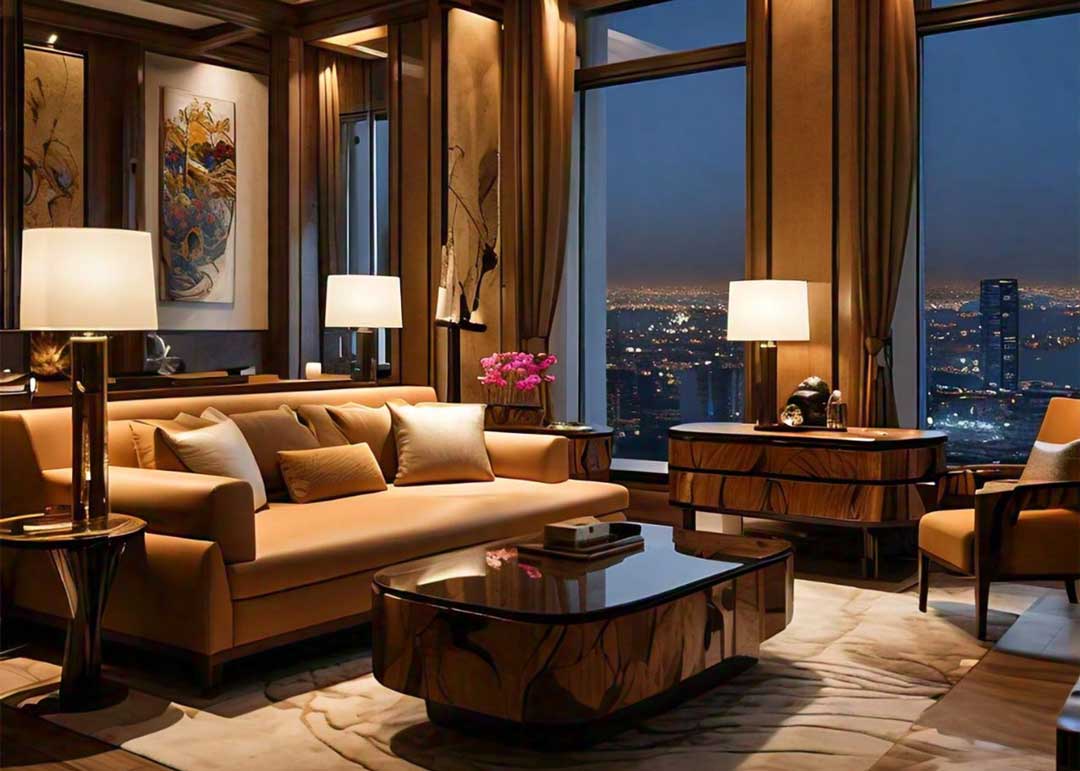How to Choose and Maintain the Housekeeping Trolleys for Hotels in UAE
November 5, 2024

Dubai, renowned for its towering skyscrapers and innovative architecture, stands as a beacon of modern luxury and sophistication. However, amidst this urban grandeur, a rising trend is weaving the beauty of nature into the city’s high-end hospitality scene—wooden elements. From opulent hotel lobbies to tranquil spa sanctuaries, wood is making a stylish resurgence, bringing warmth, elegance, and sustainability to Dubai’s hotels. Let’s delve into how these “wooden marvels” are reshaping the hospitality landscape in this dynamic metropolis.
The Rise of Biophilic Design
Biophilic design, which aims to blend nature with built environments, has seen a surge in popularity within the global hospitality industry. Dubai, always at the forefront of trends, has eagerly adopted this approach. Wood, a key element, is pivotal in bringing the outdoors inside. Whether through wooden walls, furniture, or detailed ceiling panels, its natural textures and tones foster a calming atmosphere, offering a serene contrast to Dubai’s sleek, high-tech urban landscape.
Fostering a feeling of warmth and comfort
Wood brings a tactile and visual softness that other materials often lack. While glass and steel dominate Dubai’s skyline, within hotels, wood creates a warm and welcoming environment, offering guests a cozy retreat. This is particularly vital in a bustling city like Dubai, where travelers crave respite from the hectic streets. The rich tones and natural grain of wood effortlessly inspire a sense of peace and relaxation, transforming hotel lobbies, guest rooms, and lounges into serene sanctuaries.
Enhancing Aesthetic Appeal
Dubai’s hotels are renowned for their luxury, and wood, with its inherent versatility, plays a key role in elevating this grandeur. Whether it’s contemporary minimalist designs or traditional Arabian elements, wood seamlessly complements diverse interior styles. It can be intricately carved into Arabic mashrabiya (decorative wooden screens) or left in its natural, raw form to achieve a rustic-chic ambiance. In luxury suites, bespoke wooden furniture and paneling infuse an elegant, personalized touch, enriching the guest experience with a perfect blend of sophistication and timeless charm.
Wooden Architecture: Bridging Tradition and Modernity
Dubai’s hospitality sector excels in merging the traditional with the contemporary, and wooden architecture plays a pivotal role in this synthesis. Historically, wood has been a fundamental element in Middle Eastern construction, evident in traditional wind towers (barjeel) and the doors of ancient Arabian homes. By integrating wooden features into modern hotel designs, architects pay tribute to the region’s cultural legacy while embracing current design trends.
A remarkable example of this is the Al Seef Heritage Hotel, where traditional Emirati craftsmanship is showcased through intricate wooden details, harmoniously blending with the modernity of Dubai Creek. The hotel’s design pays homage to the city’s rich history, illustrating how wood serves as a bridge between Dubai’s past and its future.
Sustainable Luxury: The Eco-Friendly Charm of Wood
As sustainability gains prominence worldwide, wooden elements are becoming increasingly valued in eco-conscious hotel designs. When sourced from responsibly managed forests, wood is a renewable resource that can substantially lower a hotel’s carbon footprint. Luxury hotels in Dubai are embracing this trend by incorporating sustainable wood into their construction and design, responding to the rising demand for eco-friendly accommodations.
Wood contributes to sustainability in two primary ways
Energy Efficiency: Wooden structures often exhibit superior insulation properties, leading to reduced energy consumption for heating and cooling.
Longevity and Durability: When properly treated, wood is exceptionally durable, making it a long-lasting material that requires less maintenance over time, in line with the principles of sustainable hospitality.
Hotels such as Anantara – The Palm Dubai Resort incorporate sustainable wood not only for its visual appeal but also for its environmental advantages. The resort’s wooden villas and over-water suites blend luxurious design with eco-friendly materials, demonstrating that sustainability and opulence can coexist harmoniously.
Artistic Wooden Accents: Where Craftsmanship Meets Innovation
In Dubai’s luxury hotels, wood transcends its role as a mere building material; it becomes a canvas for artistic expression. Both local and international artisans are crafting exquisite wooden installations, from bespoke furniture to intricate wall sculptures. These wooden creations infuse a sense of luxury and personalization that distinguishes Dubai’s hotels.
A prime example is the One& Only – The Palm, where custom wooden artworks grace the walls, and hand-carved wooden doors evoke the opulence of Middle Eastern palaces. The blend of artistry and functionality in these wooden features enhances the guest experience, transforming each stay into a luxurious journey through exceptional craftsmanship.
Future of Wooden Design in Dubai’s Hotels
As the hospitality industry evolves, so too does the role of wood in hotel design. In Dubai, a city defined by luxury and innovation, we can expect an even stronger focus on sustainable, biophilic designs that creatively incorporate wood. From reclaimed wooden flooring to avant-garde wooden architecture that challenges conventional design limits, Dubai’s hotels are poised to continue exploring the limitless potential of wood.
To Conclude
Dubai is redefining luxury hospitality by incorporating the timeless elegance of wood into its hotels, showcasing the perfect harmony between nature and opulence. From the moment you enter a grand lobby to the serene ambiance of a wooden-clad spa, the enchanting beauty of these wooden features promises to create an unforgettable experience for every guest.